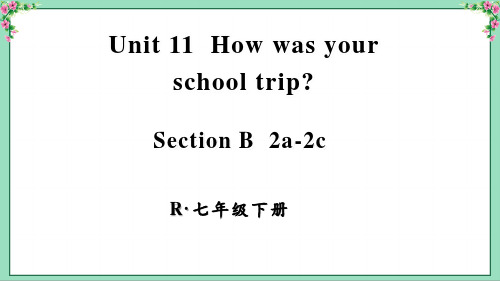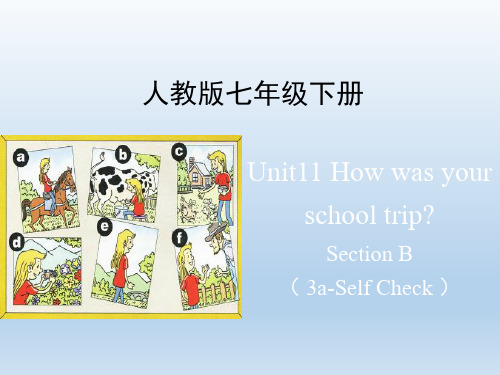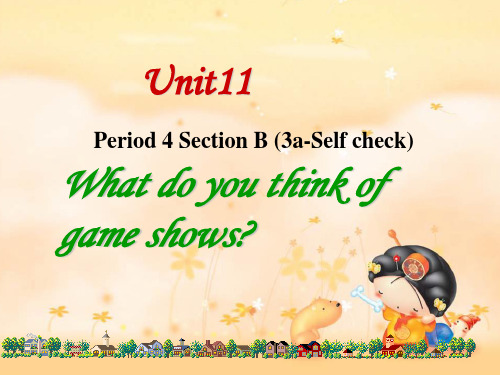2014七年级英语下 unit 11 Section B 1
人教版英语七年级下册Unit 11 Section B(2a-2c)新版课件

1. Did Helen and Jim go on the same trip? Yes, they did.
2. How do they feel about the trip? Helen thought the trip was interesting, but Jim thought the trip was terrible.
IH阅setne读ttlaee技lnnkc巧sea)na:bd或能oJu主i够mt题a归h句s纳ac(vh文eotoo章dplii或ftcfres段ierpne落ttneot大nacf意ees)ec的lii,ne句通ngcs子常ea叫出mbo做现uus中在teut心文hme句章.tA(或rinpk段d.ey
large
interesting
boring cool
amazing
modern
Let’s read two diaries from Helen and Jim.
Read the first two sentences and the last sentence& predict what the diaries are talking about.
总的来说,相当于in a word或in short.
含有宾语从句的主从复合句;主句为一般现
在时态,宾语从句根据具体情况选用所需
时态。宾语从句要保持陈述语序。
June 15th
I think today’s school trip was terrible. We took the
train to the museum. It was so hot on the slow train.
that, I went to the gexifctitsinhgopadaj.n令d人b兴ou奋gh的t,so令m人e 激动的
新目标七年级下英语册Unit 11 Section B (3a-Self check)课件

一、填空
1.My grandfather likes wearing fashion clothes. He doesn’t mind what young people think of (认为)him.
2. The old men can’t stand it’s too noisy.
3. Her sister loves
answering . my questions
You’re welcome
by Maria Lee This week, I asked students about fashion. I showed each student six things and asked them about each one. Some of their answers were interesting. Here are their likes and dislikes: Judy Smith likes the key ring. Her friend Jeff says he can’t stand the scarf. “ It’s for moms!” he said. William Jones loves the wallet, and his classmate Gina Taylor loves the watch. ( Her best friend Ann Rice doesn’t mind the watch, but she really likes the sunglasses!) Jerry Green also likes the sunglasses. And the coolest thing was the belt. Everyone loved it!
人教版七年级英语下册Unit11_SectionB(3a-Self_Check)名师课件

请同学们拿出答 题器进行作答
2. ____ he ____ TV every day? B
A. Did; watched B. Does; watch C. Does; watched
3. __ is nice here. We all like playing here.C
A.Something B. Anything C. Everything
请同学们拿出答 题器进行抢答
What are they doing in each picture?
Look at the pictures and Bob’s diary and answer the questions.
1. Where did Bob do? Bob went to a zoo.
4. I like ____ train because I can watch the scenes more easily
along the way. A
A. slow B. fast
C. tall
5. —____.
— It was exciting and interesting. C
A. How’s its going?
arrive-arrived
hope-hoped live-lived move-moved dance-danced
study-studied
worry-worried cry-cried
stop-stopped
plan-planned prefer-preferred fit-fitted
get-got
not…at all
Pair work
请同学们拿出答 题器进行抢答
新目标英语七年级下册Unit_11_Section_B

3c. Now write a diary entry for your own school trip. Explain if you liked it or didn’t like it and why.
Example:
Diary
Yesterday we went on a school trip to a bicycle ______________________________________ museum. My friend Bill liked it a lot. He really ______________________________________ liked looking at the old bikes. But I did not enjoy ______________________________________ the museum very much. I am not really interested ______________________________________ in bicycles. I like computers more. Also, there were ______________________________________ too many people at the museum, and they were very ______________________________________ noisy. The museum restaurant was expensive, too. ______________________________________ I hope we can go to a computer museum next year. ______________________________________
人教版英语七年级下册Unit 11 Section B(1a-1d)新课件

B: I… A:Did you...
B: Yes, I did./ No, I didn’t.
Look at the pictures and make a dialogue.
e
a c
b
d
f
For example
a
A:How was your school trip? B:It was__in__te_r_e_s_ti_n_g_____. A:Where did you go? B:I went to __a_z_o_o________. The
B: Yes, I did. I can share them with you.
A:How was your school trip? B:It was__b_o_r_in__g________. A:Really, where did you go? B:I went to _a_p__a_rk__w_i_t_h_m__y_f_r_i_en__d_s_. The
1c What was your last school trip like? Discuss
it with your partner.
I went to ...
That sounds …
Ask and answer in pairs.
A:How was your school trip? B:It was +boring/interesting/great/terrible… A:Where did you go? B:I went to…The weather was… A:That sounds…What did you do on your
weather was __cl_o_u_d_y________.
七年级下册Unit 11 Section B (3a-Self check)课件

谈论对某事物的看法和态度所用的句型 • What do you think of soap operas /……? I love/ like / don’t mind/ don’t like/ can’t stand them What does Tony think of…… the wallet? He loves/ likes / doesn’t mind/ doesn’t like/ can’t stand it. It’s boring/interesting/awful/great. They are beautiful/ugly/cute/awful/good-looking/too expensive.
2.语言技能: 1) 听: 能听懂本课学习活动中的问题,并能做出较得体的回答。 2) 说: 能正确朗读本单元对话和句型;能在任务型活动中使用本单元所学的语言知识进行简单 的交流,如:谈论流行文 化,谈论自己对电视节目、日常生活用品以及日常生活现象的看法和意见等。 3) 读: 能完成本单元短文阅读任务。 4) 写: 能写出本单元学习的单词和句型;能运用句子书面表达自己对电视节目、日常生活用品 以及日常生活现象的看法和 意见,并简单陈述理由。 3.学习策略: 1) 积极与他人合作,共同完成学习任务。 2) 注意观察生活或媒体中使用的简单英语,利用不同媒体获取相关的学习资源。 3) 在学习中善于利用图画等非语言信息理解主题。 4.情感目标: 1) 能在小组活动中积极与他人合作,相互帮助,共同完成学习任务。 2) 能在英语交流中注意并理解他人的情感和态度。 3) 乐于接触并了解本国和异国的流行文化,能用恰当的方式表达自己的观点和意见。
answering my questions .
You’re welcome
Unit11SectionB(1a_1d)课件英语人教版七年级下册
基础巩固练
一、单项选择。
1. —How was your last weekend
— ____B. It rained all the weekend. I had to stay at home.
C. Yes, he was
D. No, he wasn’t
【解析】根据答句中“He went to the zoo. 他去动物园 了。”可知他没有去公园,且问句是did开头的一般疑 问句。故选B。
基础巩固练
3. — ___A__the milk fresh(新鲜的) in the supermarket
1. How was Jane’s trip ___It_w__a_s_t_e_r_ri_b_l_e_. _____
2. How was Tony’s trip ___I_t_w_a_s__g_re_a_t_._______
1c
Listen again. What did Jane and Tony do on their last school trip Check (√)Tony or
special art room and __d_r_e_w_pictures. It was so
much __f_u_n__. All in all, Tony had a _g_o_o__d time.
1d What was your last school trip like Discuss it with your partner with the following words.
yesterday
人教版七年级英语下册Unit 11 Section B 3a-Self Check 课件
Now write a diary entry for your own 3c school trip. Explain whether you liked
it or not and why.
__________________ __________________ __________________ __________________ __________________ __________________
a lot of flowers.
Exercises
Ⅰ.用所给单词的适当形式填空。 1. Bill h_e_l_p_e_d_(help) his mother clean the room yesterday. 2. On my last day off, I s_l_e_p_t_(sleep) late. 3. They __h_a_d__(have) a school trip last
2 Complete the conversations with the correct forms of the verbs in the box .
have be
do swim go see feed
have be
do swim go see feed
1. A: I went to the countryside this
summer. B: Really? How__w_a_s_ the trip?
A: It_w__a_s_ great!
B: What _d_i_d__ you__d_o__there?
11单元英语七年级下册知识点B
11单元英语七年级下册知识点B11 Unit English Grade 7 Book B Knowledge PointsGrade 7 Book B of English includes 11 units, covering a wide range of knowledge points. In this article, we'll explore and summarize the key topics of each unit.Unit 1: Personal InformationThis unit focuses on introducing oneself in English, including name, age, nationality, and hobbies. Students will learn basic sentence structures and commonly used words in daily conversations.Unit 2: My School LifeIn this unit, students will learn how to describe school life in English. Topics covered include classrooms, teachers, friends, routines, and school activities. Students will also learn how to talk about their favorite subjects and extracurricular activities.Unit 3: My DayThis unit teaches students how to talk about their daily routines and time expressions in English. Students will learn how to tell time, talk about daily activities, and express the duration of activities.Unit 4: My Family and FriendsStudents will learn how to introduce and describe their family members and friends in this unit. Vocabulary and sentence structures related to family relationships, appearances, and personalities will be introduced.Unit 5: Food and DrinksThis unit focuses on food and drinks vocabulary. Students will learn how to order food in a restaurant, ask for recommendations, and describe their preferences.Unit 6: The WeatherIn this unit, students will learn how to describe the weather and climate in English. They will learn weather-related vocabulary, such as sunny, cloudy, rainy, and snowy.Unit 7: TransportationThis unit introduces transportation vocabulary, including vehicles and transportation methods. Students will learn how to ask for and give directions, and how to describe different modes of transportation.Unit 8: Holidays and CelebrationsStudents will learn how to talk about holidays and celebrations in English. This unit covers vocabulary, customs, and traditions related to Christmas, Halloween, Thanksgiving, and other holidays.Unit 9: Health and FitnessIn this unit, students will learn health and fitness-related vocabulary and sentence structures. Topics covered include physical activities, healthy eating habits, and common illnesses.Unit 10: EntertainmentThis unit introduces vocabulary related to different forms of entertainment, such as movies, music, and sports. Students will learn how to talk about their favorite entertainment activities and express opinions about them.Unit 11: The World Around UsThis final unit covers geography and environmental topics. Students will learn vocabulary and sentence structures related to different countries and cultures, natural resources, and environmental issues.In conclusion, Grade 7 Book B of English covers a broad range of knowledge points, including personal information, school life, daily routines, food and drinks, transportation, holidays and celebrations, health and fitness, entertainment, and the world around us. By completing these units, students will gain a better understanding of spoken and written English and be able to communicate with native speakers more effectively.。
英语七年级下Unit_11_How_was_your_school_trip_SectionB
go for a walk
ride a horse
pick strawberries talk with a farmer feed chickens
take some photos
visit my grandparents
go fishing
climb a mountain
What do you do every day?
What did you do last weekend? fed chickens
feed chickens
milk a cow
milked a cow
ride a horse
rode a horse
What does he/she What did he/she do every day? do yesterday? He /She.... watches the stars watched the stars
再加
• 4 重读闭音节结尾,双写动词尾辅音字母再加- ed • • stop—stopped shop—shopped
• • • • •
动词的不规则变化: go—went have—had eat—ate buy—bought go—went ride—rode is/am-was are-were
1b Listen and answer the questions.
1. How was Jane’s trip? It was terrible. ___________________________________ 2. How was Tony’s trip? It was great. ___________________________________
- 1、下载文档前请自行甄别文档内容的完整性,平台不提供额外的编辑、内容补充、找答案等附加服务。
- 2、"仅部分预览"的文档,不可在线预览部分如存在完整性等问题,可反馈申请退款(可完整预览的文档不适用该条件!)。
- 3、如文档侵犯您的权益,请联系客服反馈,我们会尽快为您处理(人工客服工作时间:9:00-18:30)。
翻译下列句子。 (1) 埃米(Amy)对历史感兴趣。 Amy is interested in history. (2) 他们对制做飞机模型感兴趣。 They are interested in making model planes.
6. … it was difficult to take photos.
5. I’m not interested in that. be interested in意为“对……感兴趣”, 主语通常为人,其后可接名词、代词或 动词⁃ing形式等。如: My brother is interested in basketball. 我弟弟对篮球感兴趣。 She was interested in running last year. 去年她对跑步感兴趣。
aa Helen the trip exciting the train fast the museum really Jim terrible
slow big, boring, dark, too many people
interesting
the gift shop lovely, not expensive and gifts
2a Do the following words describe good things or bad things? Put a √ for good and an × for bad. Leave a blank if they can mean both. ___ √ interesting ___ √ lovely × difficult ___ ___ ___ √ exciting ___ × slow × boring ___ ___ ___ √ √ cool √ lucky × hot ___ ___ √ large × expensive ___ × terrible ___ ___ × cheap √ delicious ___ √ great √ ___ √ ×fast
teach oneself 自学
3. All in all, it was an exciting day. all in all 总的来说,总而言之 an exciting day 让人兴奋的一天 exciting是形容词, 后接名词,意思是 “让人兴奋的,使人兴奋的”,多形容 物。 excited也是形容词, 多用来形容人感到, 同类的有interesting, interested; boring, bored。
Helen thought the trip was really interesting. But Jim thought the trip was terrible.
2c Read the diaries again and complete the chart. How do Helen and Jim desc源自ibe these things?
1d What was your last school trip like? Discuss it with your partner using the following words.
interesting difficult lovely (可爱的) slow(缓慢的,迟缓的) exciting (令人兴奋的,令人激动的) boring cool hot lucky large expensive (昂贵的) terrible delicious great cheap fast (快的)
1c Listen again. What did Jane and Tony do on their last school trip? Check √ Tony or Jane.
went to climbed went to saw drew some pictures the a an art countryside mountain museum paint ings Tony Jane
1 go to the zoo 2 visit a museum 3 ride a horse 4 climb a mountain 5 visit a fire station 6 go fishing
1a Match the activities with the pictures.
1. go to the zoo a __ 2. visit a museum __ c 3. ride a horse __ 4. climb a mountain __ b e 5. visit a fire station __ d 6. go fishing __ f
√ √ √
√
√
Listen again and try to write down the sentences for describing the journey.
Oh, it was terrible. Oh, that’s too bad. There were so many interesting things to see. The food was really delicious. It was so much fun. Sound like you had a great school trip.
2b Read Helen’s and Jim’s diary entries and answer the questions. 1. Did Helen and Jim go on the same trip?
Yes, they did. They went on the same trip. 2. How do they feel about the trip?
A: I went to a farm on my last school trip. There were many animals on the farm. They were very lovely. B: That sounds great. A: How was your school trip? B: It was __________ A: How was the food there? B: It was _____________ A: How was the weather? B: It was ___________
翻译下列短语和句子。
1. 到达那儿
2. 下棋 弹钢琴 打篮球
get there
play chess
play the piano
play basketball
3. 对......感兴趣 be interested in all in all 4. 总之
not … at all 5. 根本不 6. 今天的报纸 today’s newspaper too many students 7. 太多学生 too much water 太多水 8. 学英语对我来说很容易。 It is easy for me to learn English. 9. 上周李老师教我如何下棋。 Last week Mr. Li taught me how to play chess.
Each student tells an activity on the school trip.
Last year, we went to the zoo. we __________ in the zoo. After that we ___________. We ______________. __________________.
basketball, play chess, play cards。play
后接乐器时,前面则加定冠词,如: play
the violin, play the piano。
2. Then the guide taught us how to make a model robot. teach sb. to do sth. 教某人做某事 teach sb. sth. 教某人某事
It is + adj. (for sb.) to do sth. (对某人来 说)做 …... 怎么样 e.g. 对我来说骑车上学是很容易的。 It is easy for me to go to school by bike.
7. There were also too many people. too many加可数名词 too many students too much加不可数名词 too much water 8. I didn’t like the trip at all. 我一点也不喜欢这次旅游。 not… at all “一点也不;根本不” e.g. 我根本不喜欢吃苹果。 I don’t like apples at all.
4. today’s school trip 表示有生命的东西的名词及某些表示时 间、距离、星球、世界、国家等无生命的东 西的名词后加 ’s来表示所有关系,叫做名 词所有格。 例如: a mile’s distance 一英里的距离 但如果该名词是以-s或-es接尾,则只在该名 词后加“ ’ ”来构成所有格。 例如: 3 hours’ walk 三小时的路程 five minutes’ walk 五分钟路程 two miles’ distance 两英里的距离
1b Listen and answer the questions. 1. How was Jane’s trip? It was terrible. ____________________ 2. How was Tony’s trip? ____________________ It was great.
so expensive
Why did Helen and Jim have different opinions about the same trip?
